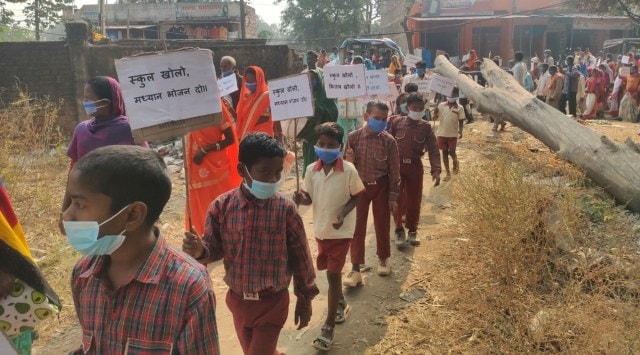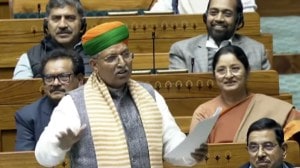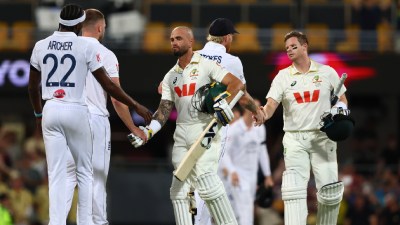Stay updated with the latest - Click here to follow us on Instagram
Jharkhand: No access to online classes, primary students demand reopening of schools
The students and their parents walked from Manika block headquarters, covering about a kilometre, and ending the march at Manika High School in protest against the government’s alleged delay in opening the primary schools
 The rally was organised by Gram Swaraj Mazdoor Sangh (GSMS), a local organisation of rural workers. (Express Photo)
The rally was organised by Gram Swaraj Mazdoor Sangh (GSMS), a local organisation of rural workers. (Express Photo)It is Friday afternoon, seven-year-old Amita Kumari, who belongs to a tribal community and was in Class 2 when the Covid pandemic struck early last year, is among the 100-odd primary school students from Manika block of Latehar district in Jharkhand participating in ‘School Kholo’ protest.
The students and their parents walked from Manika block headquarters, covering about a kilometre, and ending the march at Manika High School in protest against the government’s alleged delay in opening the primary schools i.e; from Class 1-5, which they said is ‘hampering their growth’.
The rally was organised by Gram Swaraj Mazdoor Sangh (GSMS), a local organisation of rural workers, and protesters said that in areas like Manika, very few children can study online due to poor internet connectivity and lack of smart phones.
Jharkhand government’s data, given in the Assembly in September, says only 35 per cent of the students benefitted from online content given on Whatsapp, Doordarshan and radio. It said learning content is being “shared daily for over a year via 47,000 WhatsApp groups created at all levels, covering around 13 lakh students”. As many as 37 lakh students are enrolled in Classes 1-8.
But children like Amita are not a part of this number.
A GSMS survey has revealed that online education has impacted the learning outcomes. “During a village-to-village campaign before the rally, our volunteers found that most children in the primary-level age group are unable to read a simple sentence. This is consistent with the findings of the School Children’s Online and Offline Learning (SCHOOL) survey in 15 states earlier this year which showed that among poor rural families, only 25 per cent of Class 3 children were able to read a simple sentence,” said James Herenz, part of GSMS.
What compounds the problem for most parents in Manika is that they cannot afford private tuitions for their children. Amita’s father Kharidan Oraon, a daily wage labourer, says he worked in Haryana, melting used batteries, earning Rs 300 per day. “Out of Rs 9,000, I used to send Rs 7,000 home…Five months ago, I fractured my hand in an accident and since then, I have been unable to earn, and we are living off loans. I cannot afford online education for my three children,” he said.
Protesters on Friday asked why schools are continuing to remain shut when crowds are allowed in markets, weddings and even cricket stadiums. “A huge crowd was allowed to atted a meeting addressed by Chief Minister Hemant Soren in Daltonganj, just an hour from Manika. A few weeks earlier, 40,000 people were allowed to crowd a stadium in Ranchi for the India-New Zealand cricket match…But our children’s future is being ruined,” they said.
Government sources said the probability of a third Covid wave and the recent Omicron variant scare have delayed the decision. Latehar Deputy Commissiomer Abu Imran said directions for opening of primary schools will come from the state headquarters.
Kiran Kumar Pasi, State Project Director, Jharkhand Education Project Council–an autonomous body under School Education and Literacy Department–said they have made various representations to the Disaster Management Department to open schools. “We are waiting for their go-ahead.” Sources said it is up to the Chief Minister and the Health Minister to take a decision as they are the first and second in command respectively in the Disaster Management Authority. Both were unavailable for comment.







